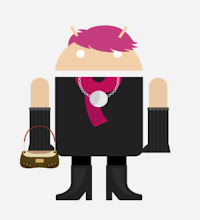How do we manage creative people? “Let them be unproductive until they are.” Don Draper, Mad Men
Two decades of working as a designer in business has provided many lessons learned over the years. I'd like to pause, momentarily, and put forth this short list of insights for my fellow workers in the business world. Specifically, you who lead the business world and shape the direction of products and services we rely on daily, these are the things I'd like you to know.
What makes me good at my job won't always make me good at fitting into your enterprise.
As a designer, I naturally challenge the status quo. I find new ways to solve existing problems. I deal in the novel, the possible but not yet realized. This approach challenges stasis, balance, routine, ultimately nudging people out of their comfort zone. It's not always fun for those who aren't ready for change. Often, I hear "what's wrong with how we are doing it now? It seems to be working." Sometimes they have some data to back it up. From last week, last month, or last quarter. But I'm looking into the future, and I usually take the long view.
I design for people.
I care about people. Real, flesh-and-blood people. Not markets. Not audiences. Not segments. Not nameless, faceless groups that you talk about in order to improve margins and, ultimately, make more money. I care about one person at a time, and I eventually group like ones together (into a tool that I use, called personas). I need a name, a face, emotions, motivations and goals. Once I get that, nothing can stop me from thinking creatively about their needs and how we can meet them. Or their pain, and how we can remove it.
I'm not so much motivated by money.
Don't get me wrong. I love money. Having it means I have a place to live, a car to drive, care for my kids and occasionally take a vacation (woot!). However, if you want to get me to do something great, give me a cause, a purpose, a reason.
Before I got into this line of work, I set my sights on social work, non-profits or academia. All have a reputation for benefits other than money: changing people’s lives, offering a cause to believe in, providing mental stimulation and camaraderie. These are all things that drive me.
Yes, I could change my career path and go do those things. But, ultimately, I'd find myself back here, because you control the look and feel of my smart phone, my online banking experience, my car's navigation system, how I buy different products and services online. I can add value to what you want to do. But first, I have to survive in your company.
Understanding what I do will ultimately serve you.
I have a passion for what I do, and that can benefit you. As long as I feel part of a larger cause, making a difference, I can dedicate my time to working very, very hard. And my work doesn't stop when I leave the office. I'm always on, even when I don't look like I'm "at work". Design is about problem-solving, and I solve some of my hardest problems while on the treadmill, taking a shower, or fixing dinner. I never know when that flash of insight I need will hit.
You don't see everything I put into my work.
Very few people do. I problem-solve all the time. I learn new things by doing non-work-related activities. A lot of my efforts are spent understanding the complex and the confusing (networks, information, systems, people). I ask a lot of questions. Listen to others. Gather information. In the end, I assemble something to discuss: a model, a report, a poster, a drawing. The final thing is usually beautifully elegant... which is what you hired me to do. But that's not the sum total of my work. It's just the part of the iceberg glistening above the water.
If you expect me to do great work, understand that it’s more than just the result. Design-work is hard. For all the ways it looks effortless, elegant, simple, and clear, everything that goes into it takes a lot of time and effort. Without them, my best work goes untapped.
I can learn to fit in.
I am a professional. I can learn the language of business, adopt your jargon, and take on your work style of hour-long meetings throughout the day, in order to get stuff done. I enjoy working with others with similar goals, who also want to solve problems for your customers.
To conclude:
I know you have a business to run. That's hard work. I know, because I've seen businesses thrive and fail. I'm not going to tell you how to run yours. I can only tell you how I add value. Working together, we can both succeed powerfully as we do what we love.
“We're going to sit at our desks and keep typing while the walls fall down around us because we're creative - the least important, most important thing there is.” Don Draper, Mad Men
